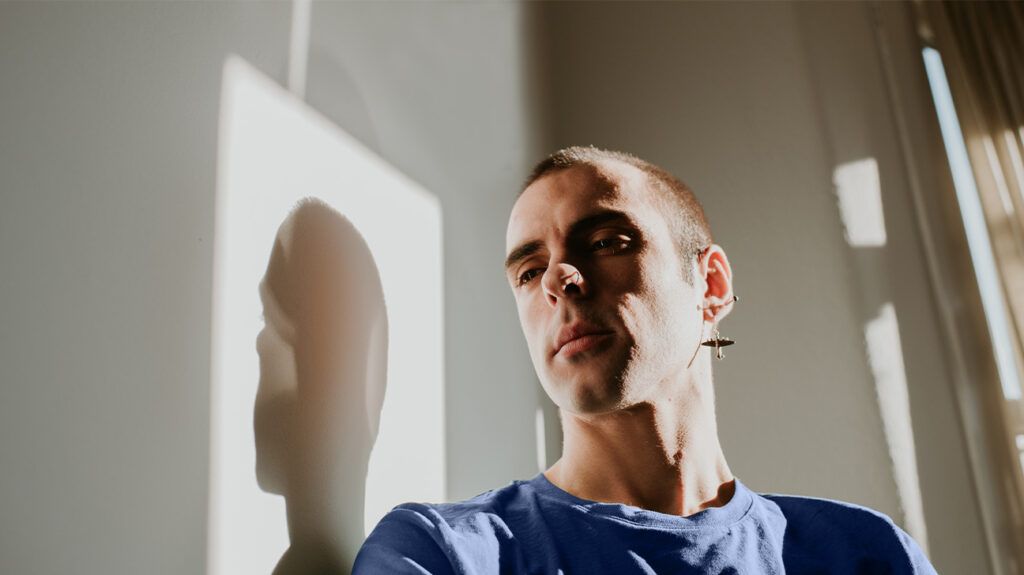Anxiety does not directly cause psychosis. However, the conditions have some similar symptoms, and people who have had severe anxiety for an extended time may experience a psychotic episode.
It may be possible for anxiety to lead to psychosis if a person’s anxiety is particularly severe, but not all people diagnosed with anxiety will develop psychosis.
Those who have had anxiety over a prolonged period, such as during childhood, may be more at risk of having a psychotic episode.
This article looks at whether there is a link between anxiety and psychosis and what these conditions are. Additionally, it provides an overview of the symptoms of anxiety with psychotic features. It also examines the similarities and differences between the two conditions and their causes, treatments, outlook, and support.

There appears to be a potential link between anxiety and psychosis, particularly when anxiety is persistent or severe.
Research from 2022 shows that persistently high levels of anxiety during childhood and adolescence could be a potential risk factor for psychosis.
The research also relates persistent anxiety symptoms to psychosis due to the activation of stress hormones and inflammation.
On the other hand,
The research continues into how the two conditions relate. This may help doctors treat cases when severe anxiety triggers psychotic episodes.
Anxiety produces
Cognitive symptoms may include:
- fear of losing control
- fear of injury or death
- confusion
- bad concentration
Physiological symptoms may include:
Behavioral symptoms may include:
- avoidance of threat cues
- restlessness
- agitation
- difficulty speaking
Affective symptoms may include:
- nervousness
- fear
- impatience
- frustration
Learn more about how anxiety affects the body.
According to the
Psychosis typically involves two major experiences: hallucinations and delusions.
Hallucinations cause people to see, hear, or feel things that are not there.
Delusions cause strong beliefs that are inconsistent with a person’s culture. For example, a person may believe that:
- external forces are controlling their thoughts, feelings, and behaviors
- trivial comments, events, or objects have personal significance
- they have special powers, are on a mission, or are God
Alongside this, a person may also experience other changes,
- disrupted emotions
- anxiety
- lack of motivation
- overall difficulty functioning
Doctors may describe psychosis as a symptom of schizophrenia. However, they can also be stand-alone conditions.
Find out more about how they differ.
A
Signs of psychosis may
- suspiciousness and paranoia
- trouble thinking logically
- general unease
- difficulty sleeping
Anxiety symptoms with similar psychotic features
- trouble sleeping
- difficulty concentrating or making decisions
- irritability and restlessness
- sense of impending danger or panic
Learn more about anxiety disorders.
Both conditions can result from psychological causes, medical conditions, medications, or past trauma.
Anxiety causes
There are different reasons a person may experience anxiety, such as:
- past or childhood experiences or trauma
- challenges with work, finances, or family stress
- physical or other mental health conditions
- certain medications causing anxiety as a side effect
- drug and alcohol misuse
Learn more about what causes anxiety.
Psychosis causes
Psychosis may result from various factors, including psychological or other general conditions.
Psychological causes include:
- mental health disorders such as schizophrenia and bipolar disorder
- severe symptoms of stress, anxiety, or depression
- lack of sleep
Medical conditions that may cause psychosis include:
- conditions affecting the immune system, such as:
- conditions affecting the brain, including:
- Alzheimer’s disease and Parkinson’s disease
- brain tumor
- sudden head injury
- parasitic infections such as malaria
- bacterial infections such as syphilis
- conditions affecting the blood, such as hypoglycemia
Other factors that may contribute to psychosis include:
- genetics
- traumatic event
- misuse of substances such as amphetamines or LSD
Treatment for these conditions usually involves a variety of talk therapies and medications.
Anxiety treatment
Doctors use standard treatment approaches for anxiety, including:
- therapy, such as guided self-help and cognitive behavioral therapy (CBT)
- medication, including selective serotonin reuptake inhibitors (SSRIs) and serotonin-norepinephrine reuptake inhibitors (SNRIs)
Find out more about anxiety treatment.
Psychosis treatment
Treatment available for psychosis includes:
- talking therapies such as CBT
- antipsychotic medications
- family intervention
The outlook for people with anxiety or psychosis depends on the individual.
Anxiety outlook
People with anxiety need
A person should speak with their mental health professional to receive appropriate treatment and support.
Psychosis outlook
Experts continue researching in this area to gain a better understanding of the likely outlook for people with psychosis.
There are many ways people with anxiety and psychosis can receive support.
Anxiety support
Support for anxiety includes:
- self-help books and programs
- talk therapies
- charities and organizations providing therapy or other advice
The Anxiety and Depression Association of America provides resources and a list of local support groups.
Read more about anxiety support at our dedicated hub.
Psychosis support
Support available for psychosis comprises:
- early interventions from a team of specialists such as:
- psychiatrists
- psychologists
- social and support workers
- mental health nurses
- community care and crisis services
Find out more about schizophrenia support groups.
There appears to be a link between anxiety and psychosis, particularly when anxiety is persistent or severe.
Anxiety symptoms have some overlaps with psychotic features, such as difficulty concentrating or making decisions, sleep difficulties, and a sense of impending danger or panic.
While anxiety may cause changes in behaviors, psychosis is not always one of them. Psychosis causes a break in reality, and although this can occur with anxiety, it does not tend to cause any noticeable changes.
Anxiety and psychosis may both result from past trauma and physical or other mental health conditions. Psychosis may also develop from other general medical conditions.
To treat anxiety and psychosis, doctors may use a combination of medication and therapy. Support is available for both through talk therapies and community and organization-led programs.


